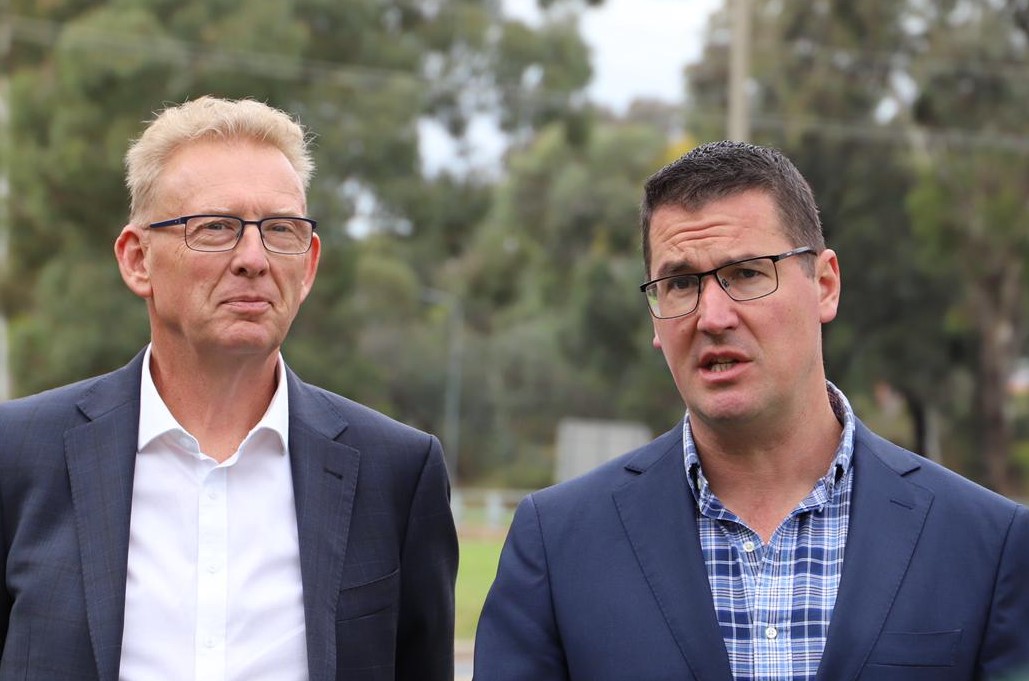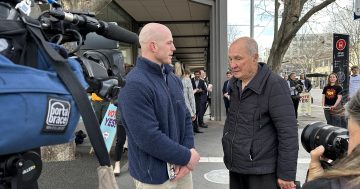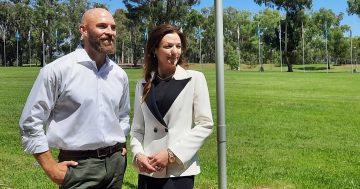
David Pocock and Zed Seselja at the Senate candidate debate. Senator Pocock benefited from the Teal movement, the review found. Photo: Michelle Kroll.
Former Liberal Senator Zed Seselja and the ACT Division of the Liberal Party have largely been absolved for the disastrous 2022 federal election campaign, with a review of the result attributing the loss to a confused position on climate change and the party being a turn-off for women voters.
The internal review conducted by Helen Kroger and Dr Mike Nahan found that while long-simmering internal divisions played a role, they were not pivotal and that a combination of federal issues including the leadership of former prime minister Scott Morrison meant the campaign was doomed from the start.
But the local party does not get off scot-free, with the review critical of its lack of unity and members prosecuting their differences in the media.
While the review said the Liberal Party should not abandon its core values to pursue votes in the ACT at the expense of votes elsewhere, it noted several times in the report the need for the Canberra Liberals to engage the community on a more diverse and broad-based level.
It noted submissions praising Mr Seselja for his work ethic and fundraising and organisational record but acknowledged that his stances on issues such as Voluntary Assisted Dying and Territory rights allowed him to be portrayed as not sticking up for the ACT.
“It also led to public disagreement between Liberals in the ACT Legislature and Minister Seselja in the months prior to the election,” the report said.
For the reviewers, this boiled down to a communication issue: “… it is worth considering in the context of the decline in the strong Liberal Party base, the degree of engagement and inclusion that was undertaken locally to explain the decisions made and the necessity for greater effort to proactively engage a broader and more diverse demographic to offset negative responses.”
The review said he was the victim of a trend away from the major parties that manifested itself in the Teal movement, which now-Senator David Pocock benefited from, particularly the ability to harvest references and attract women voters.
It also noted that Mr Seselja endured vicious personal attacks.
The internal divisions meant a loss of campaign manpower and fundraising and, in at least one instance, spilled over into the public arena.
The decision to focus on saving the Senate seat, while correct, also led to disquiet from other candidates.
The review said this disunity was something for the local party to manage if it was to again be successful but also stressed this was a two-way street, calling on members not to ventilate internal issues in public.
“For unity to prevail there must be willingness on the part of all members to move on from the past and to engage with other party members and office bearers in a constructive and positive manner,” the review said.
“There must also be a willingness to accept internal democratic outcomes, move on from disappointments, to fully support all endorsed Liberal candidates regardless of whether their views exactly align with individual philosophical views and to totally reject the use of the media to prosecute internal party matters.”
The review highlighted the difficulty the Liberal Party faced in a left-wing stronghold like the ACT where both public servants and much of the private sector are supportive of larger government.
It also argued that the pandemic spending took the edge off the Liberals’ economic credentials and lessened the role of economic policy in the 2022 campaign, especially with Labor minimising policy differences.
As a result, the Liberals ran on their record and failed to have a clear policy response on crucial issues including climate change, which was the top policy concern among ACT voters and which ranked highly among Liberal voters.
The Morrison Government’s support of a net zero target by 2050 was confusing and divided the party, the review said.
“This is a policy issue that needs to be addressed and settled so that it does not become a policy distraction at the next election,” it said.
The review found that the other big vote shifter was the perception of the Liberal Party as anti-woman, which found particular resonance in the ACT, which has the highest proportion of women – particularly young, professional women – with university education in the country.
The revelations about workplace practices and sexual harassment at Parliament House fed this perception, which was particularly damaging in the ACT.
While the Canberra Liberals could not be accused of a lack of female representation in the Legislative Assembly, the review slammed the low number of female candidates the Liberal Party fielded generally.
The review said the issue of women and their participation in conservative politics must be addressed head-on.
“It is no accident that whilst our female representation is low, the female vote is low, a fact used against us with the Teal movement supporting female candidates, many who came (or claimed to come) from notionally Liberal backgrounds,” it said.
“The Teal movement, in supporting David Pocock, capitalised upon this narrative.
“This narrative remains a fundamental challenge not only to the Liberal Party but also to the Canberra Liberals and must be addressed head-on.
“It is critical that any incumbent candidate in the ACT reflects the population and engages the electorate in a meaningful way.”
The review recommended that the party identify potential women who would be interested in becoming involved in the party, with a view to becoming a candidate.
It also recommended a tighter and more centralised and disciplined approach to the next campaign, with a recognisable chain of command.




















